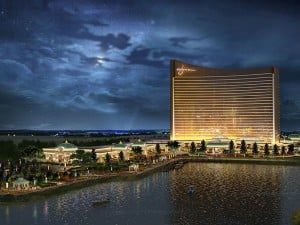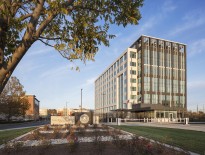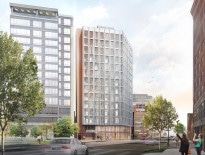Las Vegas casino tycoon Steve Wynn is certainly learning the hard way about the perils of developing a mega project in Massachusetts.
The latest lesson? Old lawsuits are like zombies: No matter how dead they may seem, they can always come roaring back to life as long as there are opponents, lawyers and money to feed them.
Case in point is Mohegan Sun’s seemingly long-shot court campaign to challenge the award of Boston-area casino license to Wynn, which just a few days ago looked as if it was awaiting the last rites.
With construction moving full speed ahead on Wynn’s now $2.4 billion casino in Everett, the pending ruling by the state’s top court seemed likely to be just a formality. But never second-guess the Supreme Judicial Court, which has breathed new life into Mohegan’s quest to build a Bay State casino.
The SJC’s March 10 ruling opened the door for Mohegan to start a new court case against the Massachusetts Gaming Commission, one that has the potential, if successful, to upend the state’s emerging casino market.
Mohegan is now free to file suit in state court for alleged violations by the commission of open meeting laws when it was deciding a couple years ago whether to award Mohegan or Wynn a coveted license to build a Boston-area casino.
And if Mohegan is successful, the Connecticut casino might just be able to win something far more substantial than a fine against the commission, which after the millions surely spent on lawyers and flaks, would be as pyrrhic a victory as they come.
The penalties, the justices ruled, could range “from nullifying the action taken at a meeting to imposing a civil penalty or compelling compliance with the law.” (Emphasis added.)
Wynn’s PR team quickly released a statement saying the ruling would have no impact on its Everett casino construction – as would be expected.
But that very ambiguous wording about the potential penalty has to be unnerving, as Wynn has already pumped a staggering $460 million into his Everett dream casino.
That said, it’s unlikely any judge at this point will pull the casino license from Wynn and hand it to Mohegan. That ship has sailed, with Suffolk Downs, the old racetrack where the Mohegan wanted to replicate its stunning Connecticut success story, now in the process of being sold to former City Hall-development-chief-turned-developer Thomas O’Brien. Housing, shops and offices, not slot machines, are what O’Brien is planning.
However, if Mohegan can prove its case, it’s possible a court might look at appropriate remedies and decide something that could be nearly as revolutionary: awarding the state’s currently unclaimed casino license in Southeastern Massachusetts to the tribal casino operator.
It’s a theory put forth by Paul DeBole, a political science professor at Lasell College and a gaming industry expert. And given all the twists and turns we’ve seen over the past few years on the road to launching casinos in Massachusetts, who’s to say it’s impossible?
“If Mohegan is resurrected … I do see Mohegan Sun putting together a great development package for something” in Southeastern Massachusetts, DeBole remarked the other day.
But if it does happen, it won’t be overnight – after all, does anything related to development in Massachusetts, especially a hotly contested one like the Boston-area casino license, happen overnight? I think not!
In fact, we could be looking at another two or three years of courtroom brawling before a judge finally decides whether to let Mohegan grab a piece of the action in Massachusetts – or to finally send the casino operator packing.
By then, Wynn Resorts will be getting ready to open its massive casino, which is tentatively slated to open in 2019.
Certainly Steve Wynn must have had it up to here with legal and regulatory battles over his long-delayed Everett casino.
Wynn spent months facing off against Mohegan in a high-stakes contest for the Boston-area casino license, ostensibly emerging victorious in September 2014. But hopes of breaking ground that fall or the next spring quickly faded amid lawsuits by Boston, Somerville and Revere challenging the Massachusetts Gaming Commission’s decision. After initially hanging back, Mohegan later joined the Revere suit.
Under pressure from opponents, state environmental regulators went into slow motion and dragged out the permitting process. Over next nearly two years, Wynn and his high-powered legal team battled Boston Mayor Marty Walsh, if not into submission, at least into a deal both sides could live with.
Wynn finally lined up the dozens of city and state permits he needed to break ground, launching construction in earnest last summer. And the seemingly long-shot Mohegan/Revere challenge still lingered, with news of lawsuit having been relegated to the back pages, when anyone bothered to write about it at all.
But just when it seemed it was smooth sailing ahead, the Massachusetts Supreme Judicial Court struck, pumping life into a dispute that everyone thought was on its last legs.
And Wynn learned a lesson that many a frustrated builder has learned in Massachusetts over the years: As long as there are opponents and rivals with money to burn, lawsuits over developments are like zombies; they just keep on coming.










